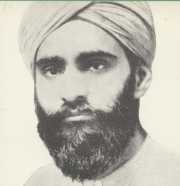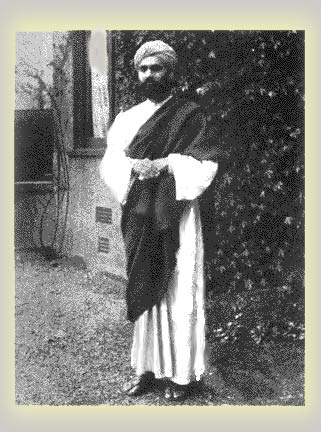
Sadhu Sundar Singh
 During the 19th century and early 20th century, thousands of courageous missionaries took the Gospel into the remote villages of India and China, the dense jungles of Africa, and the scattered islands of the Pacific Ocean. They all suffered greatly from disease, persecution, and other afflictions. But perhaps the most remarkable---and unconventional---of all these missionaries was an Indian man named Sundar Singh. He was born in 1889 into a wealthy Sikh family in India. From his early childhood, Sundar had one goal in life: to become a sadhu. A sadhu is a Hindu holy man who forsakes all possessions and journeys barefoot from village to village sharing his faith.
During the 19th century and early 20th century, thousands of courageous missionaries took the Gospel into the remote villages of India and China, the dense jungles of Africa, and the scattered islands of the Pacific Ocean. They all suffered greatly from disease, persecution, and other afflictions. But perhaps the most remarkable---and unconventional---of all these missionaries was an Indian man named Sundar Singh. He was born in 1889 into a wealthy Sikh family in India. From his early childhood, Sundar had one goal in life: to become a sadhu. A sadhu is a Hindu holy man who forsakes all possessions and journeys barefoot from village to village sharing his faith.
Sundar's mother had encouraged him when he was little not to live for himself or for enjoyment, but to seek peace and goodness. And seek he truly did. There was a yearning in his young soul that wouldn't be satisfied with anything this world can offer. He cared little about games. Instead, he read unceasingly in the Hindu and Muslim sacred writings. He attended a Christian missionary school for a period of time, through which he became acquainted with the Christian Bible. However, he hated the religion of the Christians. In fact, when he was fifteen, Sundar soaked his copy of the Bible in kerosene and then burned it.
Sundar's Conversion
By now, Sundar realized that neither the Hindu nor Muslim religions could satisfy his soul---nor could his family's wealth. Christianity seemed no better, and, besides, to become a Christian was unthinkable. So he decided to end his life by throwing himself under the train that passed by his house every morning at 5:00 a.m. On the night before his planned suicide, Sundar went to bed early. He woke up at 3:00 a.m. the next morning and cried out earnestly for an hour and a half: "If there is a God, let Him show me the way of salvation, and I will serve Him all of my life. Otherwise, I shall kill myself." Over and over again he repeated this prayer.
Suddenly, a half hour before the train came by his house, Jesus appeared to Sundar in a glorious vision. He spoke lovingly to Sundar, saying, "I died for you. I am the Savior of the world." Sundar fell at His feet and his tortured soul experienced true peace for the first time in his life. So powerful was this miraculous vision that Sundar was thoroughly converted, now loving Christ and His Church as much as he had formerly hated them.
However, it is not easy for a Sikh to become a Christian. From the very morning after his glorious vision, Sundar was tempted and tested in ways that few of us ever experience. Time and again, his family offered him wealth, power, and position if he would renounce his newly found Christian faith.
When that didn't work, they reminded him of the disgrace he would bring upon the family if he remained a Christian. That was perhaps the hardest test for Sundar. For he truly loved his family, and he did not want to hurt them in any way. Yet, he also thought about the love on Christ's face when he appeared to Sundar in the vision. He realized that he must choose Christ even over his own family. Throughout his life, one of the most striking qualities about Sundar was the boldness with which he stood for Christ.
When it was obvious that Sundar would not change his mind, his family cursed him, disowned him, and kicked him out of the house. However, right before throwing him out, they had put poison in his food, from which Sundar nearly died. However, through God's grace, he eventually recovered.
Sundar, the Christian Sadhu
 Sundar now set out to learn more about Christ and his teachings. On his sixteenth birthday, he was baptized by Anglican missionaries. Within five weeks of his baptism, Sundar gave away his few possessions and donned the saffron-colored robe of an Indian holy man-a sadhu. From then on, he was known as Sadhu Sundar Singh.
Sundar now set out to learn more about Christ and his teachings. On his sixteenth birthday, he was baptized by Anglican missionaries. Within five weeks of his baptism, Sundar gave away his few possessions and donned the saffron-colored robe of an Indian holy man-a sadhu. From then on, he was known as Sadhu Sundar Singh.
Sundar wanted to take the gospel message to the Indian people in a way that they would best understand. So Sundar journeyed barefoot from village to village, preaching the good news of Christ's kingdom---sort of an Indian St. Francis. He journeyed throughout Punjab, Kashmir, and India; he even went into Tibet and preached. Although Sundar was a gifted preacher, his love and holiness won even more converts for Christ than did his words. Despite poverty, hunger, frequent illness, and harsh persecution, he always radiated Christ's love and joy.
Persecution
An example of the type of persecution he endured was his experience in the Indian village of Ilom. He had been preaching there only a short time before one of the Hindu men began interrupting him and reviling Christ. Sundar gave the man a copy of the Gospel of Mark, but the man immediately tore it up and registered a complaint with the local police.
Sundar was quickly arrested and sentenced to six months imprisonment. He was thrown into a common jail among thieves and murderers. However, rather than despairing, Sundar began preaching to the men, and he found them quite receptive to the gospel. When the jailer discovered this, he ordered Sundar to quit preaching. Sundar boldly replied that he had to obey his Master and preach the Word.
The jailer then ordered the other prisoners to quit listening to Sundar. However, the prisoners pointed out to the jailer that they had been sent to prison to repent of their evil ways, and that Sundar's preaching was convicting them to do that very thing. They said that the government should be happy about his preaching, rather than punishing him for it.
Unable to answer the simple logic of the prisoners, the jailer went to the governor to seek his advice. The governor told the jailer to somehow isolate Sundar from the other prisoners. So the jailer took Sundar out of the common jail cell and had him thrown into a filthy cowhouse owned by the jailer. It was a small, cramped building with no windows and only one door. The stench of the place was horrible.
To make matters worse, the jailer had Sundar stripped and tied him hand and foot to a post. He then threw leeches all over Sundar's body. As the leeches began sucking his blood, Sundar prayed fervently to God. He was instantly given a great peace---a peace so comforting that he immediately burst into hymns of praise to God. Hearing his singing, a crowd gathered at the door of the cowhouse to see what was happening. Sundar then witnessed to the crowd about Christ.
As it turned out, among those in the crowd was the man who had originally brought the charges against Sundar. He was astonished to see Sundar so joyful amid such suffering. He asked the jailer what he made of it, and the jailer replied that Sundar must be mad. "If by becoming mad one could get such a wonderful peace as this," replied the man, "I would like to become mad too---in fact I would like to see the whole world become mad." Soon the governor decided to set Sundar free. Despite being weak from his suffering and loss of blood, Sundar immediately began preaching throughout the village again. The man who had originally brought the charges against Sundar now listened to him. He asked if he could have another copy of the Gospel of Mark to replace the one he had previously torn up.
Sundar's experience at Ilom was only one of the many remarkable testimonies of Sundar's life. Time after time, he laid his life on the line for Christ. And time after time, God delivered him from various trials. Sundar depended upon God exclusively for his sustenance, and God faithfully provided. Sadhu Sundar Singh was last heard of in April of 1929, when he embarked on what was to be his last missionary journey, in the foothills of the Himalayas. Nobody knows the circumstances of his death, and His body has never been found.